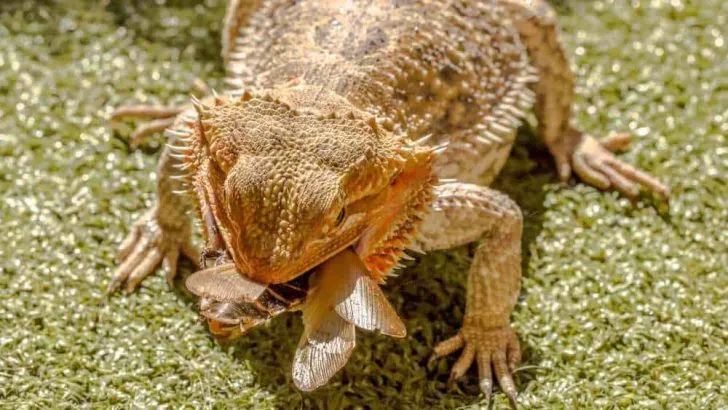Every good beardie owner is on a constant quest to find their pet some new food. By doing this you will certainly stumble upon an article that will make you ask yourself can bearded dragons eat beetles?
Unfortunately, you’ll have to look to some other insects as a good nutritional source for your pet because bearded dragons shouldn’t consume beetles.
There are some similar insects to beetles that your beardie can eat from time to time, but most of this subcategory of insects should be off the limits for your pet.
In order to learn about why you should keep your beardie away from beetles, I suggest you dive into this topic with me and perhaps learn a thing or two about your pet’s diet and why it should not contain beetles.
To find all about these, and some other things closely related to this topic and your beardies’ nutritional health, I suggest you get comfy and keep reading!
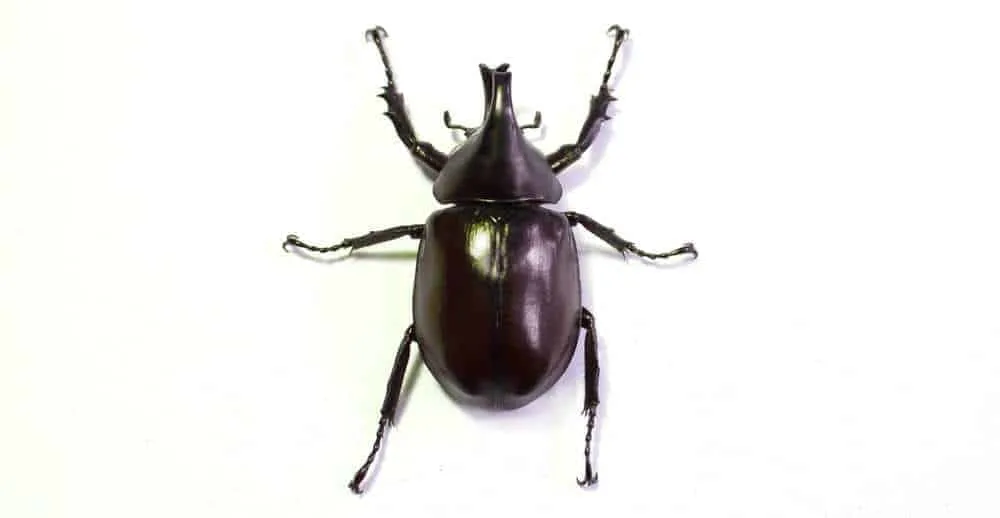
Beetles – Hard Shelled Snack
The biggest problem regarding beetles in your bearded dragon’s diet is that their shell is simply too hard to be effectively digested by your pet.
This is a defense mechanism these insects developed a long-long time ago and that kept them safe from natural predators such as bearded dragons. They are not the only ones that developed this defense system as most bugs do protect themselves and deflect the attack with a hard shell.
Diet-wise there are a few more problems with the concept of feeding your beardie almost any kind of beetles, but we’ll touch upon that later on.
Right now I’d like to simplify the concept of a hard shell of an insect to you, just so you can understand how tough they can be and how many problems they can pose for your bearded dragon.
Most beetle’s shells do crush at approximately 68 Newtons, but there are a few specimens of beetles that can withstand a force of some 149 Newtons. This is equivalent to a full-grown three-year-old putting all of its pressure on the beetle and not being able to squish it.
This tells you how durable these insects can be, and how hard it is to break their natural defenses from time to time.
Bearded dragons can achieve a force of 149 Newtons with their jaw, but that doesn’t mean it’s easy. It only means they can do it if it’s absolutely necessary but not in their regular day-to-day diet.
If they are forced to do this frequently it can cause some damage to their facial structure and jaw muscles over time. Especially if your beardie has some years and is used to eating softer foods like worms all its life, so they don’t develop that kind of strength in their jaw.
If you take a bearded dragon that had a predominantly soft-textured regular diet and you feed it a beetle, there is a possibility they won’t be able to kill it and eat it successfully. If this happens, don’t be surprised if your pet loses interest in the beetle and lets it roam freely in its tank.
Another thing that I often forget is that some beetles like Rhinoceros beetles or Hercules beetles have horns that can seriously hurt your beardie by pinching a part of their body and not letting go.
These horns are made for work and defense, so beetles are capable of holding on to something they pinch for a very long time. This can be a problem if you try to separate them because if you pull on the beetle you can damage your bearded dragon’s body further.
This was the reason I gave up on the idea of feeding my pet beetles because I didn’t want to get into a situation where my beardie is hurt by its food even if these insects were nutritionally good for them.
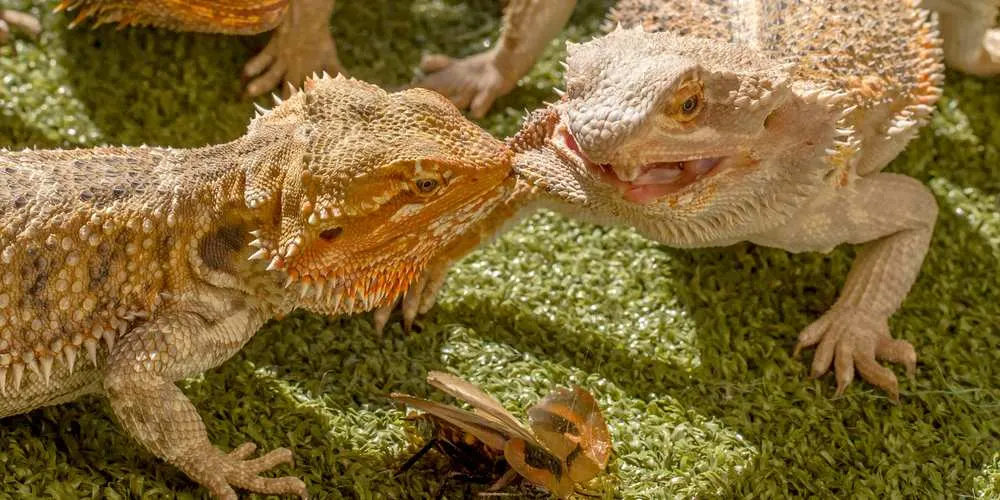
Nutritional Value Of Beetles
Nevertheless, there are some cases in which your beardie will be able to devour a beetle with a softer shell than others. If this happens it’s nothing to worry about – it won’t cause your bearded dragon any digestive problems unless it eats a bunch of them.
Beetles are rich in fat and that’s something that your pet needs in a very limited amount. Keep that in mind if you’re still thinking about feeding it some beetles.
Fat can cause an irregular stool in your pet and can also cause some diarrhea which is not a pleasant experience neither for you nor your pet.
There are minor nutritional benefits to feeding your beardies some beetles. Beetles can be rich in:
- Calcium
- Potassium
- Magnesium
- Zinc
- Iron
- Copper
As you can see, these are all good and healthy ingredients of food but are in such a small amount that it’s not worth getting your pet through tough times of eating a beetle to get to these nutrients.
There are some better alternatives to these insects which I will name later down the line which are much more nutritious and much safer for your pet’s consumption.
So to sum up the nutritional part of the discussion about beetles – it’s not worth giving them to your beardie. Not as a regular part of their diet, nor as an occasional snack.
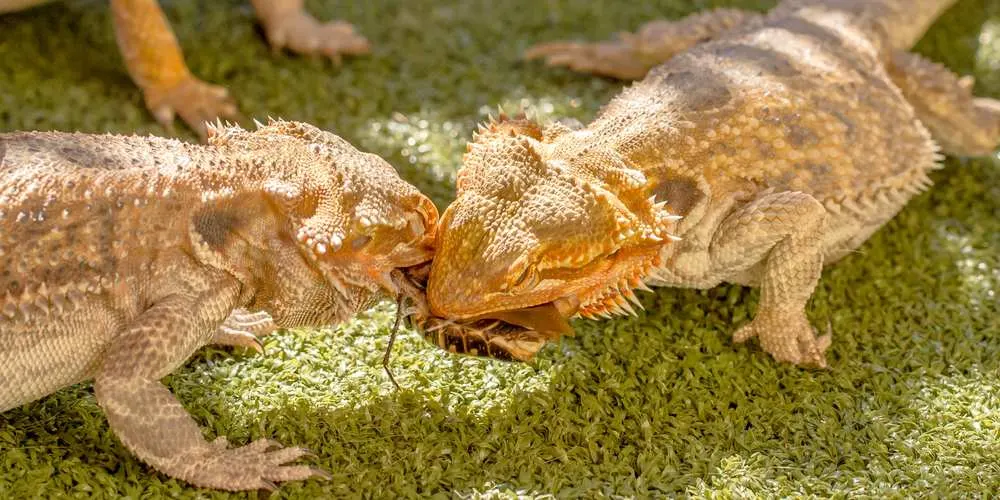
Alternatives To Beetles In Your Bearded Dragon’s Diet
I have to admit, the variety of insects and bugs a beardie can eat is quite big. This does not only make it easier for you as a beardie’s parent, but it also makes it harder for your pet to get bored of the food you serve them.
This is precisely why bearded dragons are easy to feed, and not many people complain that their pets refuse to eat much food that is served to them.
There are some widely known alternatives to beetles that your beardie will enjoy every time it gets its claws on it. Since there might be a few new beardie owners here, I made a list of these good alternatives, and here are some of my favorites:
Earth Worms
These are some of the most frequently used worms in bearded dragon’s everyday diet. They are very nutritious and can be found easily in almost every pet store. They can also be found after a rainy day, but I doubt you’ll invest the time needed to gather enough to meet your pet’s dietary requirements.
Butter Worms
Butter worms are also a good alternative to other foods and a fantastic alternative to beetles. The best thing about these is that they come much cheaper than some other worms that are often used to feed your beardies.
Super Worms
Some of the biggest worms on the market that are suitable for your beardie are super worms. The only thing that you need to keep in mind regarding these worms is – they are too big for little bearded dragon babies and beardies that are not fully grown. Always keep this in mind if you want to use these worms as alternatives to beetles.
Crickets
The crown for best and most nutritious food can arguably go to crickets. Alongside being the most nutritious, they are the most natural insects for your beardie can eat. The only downside to crickets is the smell of them. Some people can’t stand the smell of them and for that reason alone can’t implement crickets into their bearded dragon’s diet.
As you can see, there are a number of alternatives you can use instead of beetles when your beardie’s diet is the topic. Not only are these and many more insects a better idea than torturing your pet with a bug with an extremely hard shell, but are much more nutritious than beetles.
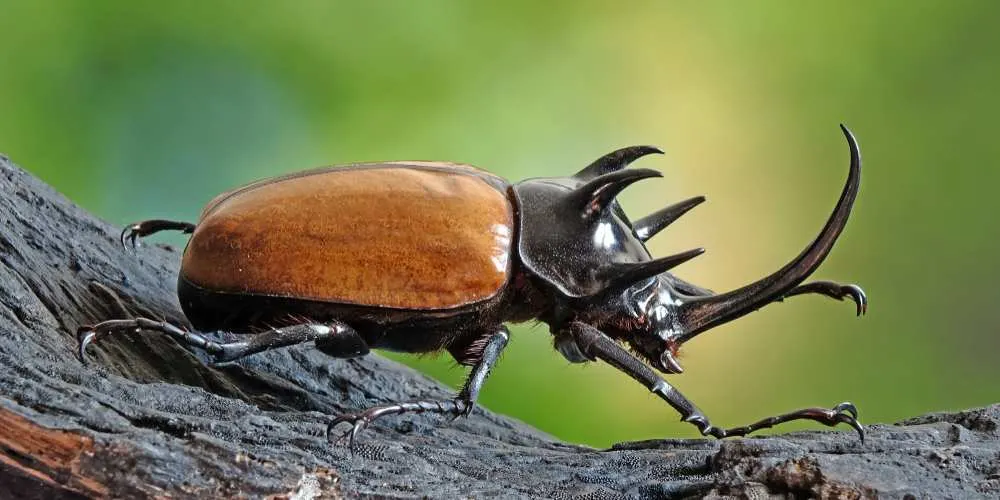
Can Bearded Dragons Eat Beetles? – Summary
If you’re still thinking about feeding your beardie some beetles and still posing a question of can bearded dragons eat beetles, you should scroll back to the beginning of the article and start over.
There are so many indicators that your pet shouldn’t get near these insects for many reasons that I’m certain it’s clear as day that you should seriously consider some alternatives.
Some that I’ve listed here and some that can be recommended to you by your local pet shop’s employees are a much better option than this hard-shelled insect. Don’t forget that beetles can even be more expensive than some alternatives like butter worms which also play a part in choosing your beardie’s food.
So, if you ask me to sum it up in one sentence, I’d say – look for the alternative and keep your bearded dragon healthy and living longer through a good diet!

